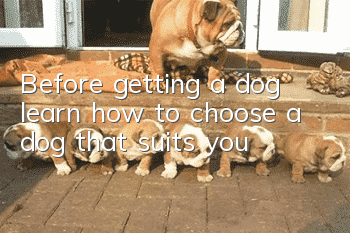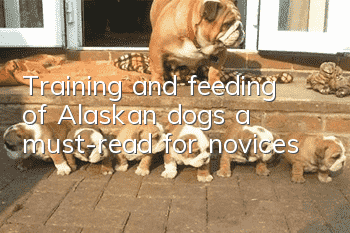Before getting a dog, learn how to choose a dog that suits you

When many people see how cute and smart other people’s dogs are, they want to raise a dog that is exactly the same. Here I want to say that whether a dog is raised well or not depends on whether other people’s raising methods are correct. It does not mean that raising an identical dog will be the same as other people’s dogs. What kind of dog you like and what kind of dog is suitable for you are two completely different concepts. This is very important. The vast majority of owners choose their dogs based on their appearance. Only when they actually take the dog home do they realize that it is not the same. So what happened, many unexpected things happened one after another. Some dogs have a lot of energy. If you don’t have enough time to take them to exercise, don’t choose. Otherwise, the dog’s extra energy will really only be put on your furniture, slippers or even... pigs. Here is a brief introduction to how to choose a dog that is suitable for you.
1. Puppy or adult dog?
One thing you have to consider is whether you have the time and energy, and whether you have basic puppy feeding knowledge. Because the feeding environment and care requirements for puppies are very high, and the pet market is a mixed bag, and the puppies that have just arrived home have tiny babies, our fans will encounter no less than 20 of them every month. These treatment costs and The cost of care all needs to be considered. Therefore, please be careful when buying puppies that are not fully vaccinated. When purchasing, please choose a regular kennel and ask for the vaccine booklet.
We don’t deny that dogs will recognize their owners more if they are raised from an early age, but in fact, most adult dogs can also do the same. For example, dogs with open personalities such as Golden Retrievers, Labrador Retrievers, and Springer Spaniels can quickly Adapt to new environment and new owners.
2. Small dog or large dog?
There is not much difference in the size of dogs in the first one or two months after they are born, but as time goes by, the gap between large dogs and small dogs will gradually become apparent.
Small dogs have relatively less space and exercise requirements, but they are more prone to barking and are relatively more sensitive. Although they are small, their personalities are not as stable as large dogs. Aggressive behaviors such as guarding food and biting are relatively common.
Large dogs mean more food, more exercise, larger size, and more need for behavioral regulation and training. For example, when a dog is a child, its actions such as jumping on people and biting hands will become dangerous once it gets bigger. If you take it out without proper training, something may happen; but on the other hand, we have to admit that most large dogs do not grow well when they reach adulthood. Finally, they have a calmer personality and are less likely to bark and disturb people, such as warm-hearted golden retrievers and Labradors.
3. Introvert or extrovert?
Outgoing and lively dogs are more interactive and closer to people, such as springers, but if your space, time and energy cannot satisfy them, then their attention may have to be on your sofa and slippers.Yes, introverted dogs seem to be able to live a good life on their own without the owner’s care. They can eat and drink when they should, but if the owner doesn’t know how to control them, the dog may become depressed or even depressed. Think that they are the master, such as Akita, Shiba Inu, etc.
4. Male dog or female dog?
Male dogs have a strong sense of territory, love to fight when they go out, and are more likely to be attracted by the smell of an estrous female and get lost; female dogs have a relatively gentle personality and will go into estrus regularly as adults. They are prone to reproductive system diseases after the age of seven or eight. Of course, you You can also choose to have your dog neutered.
5. Activity space and owner’s living habits
In fact, all dog breeds need a certain amount of time for outdoor exercise, especially those with particularly high energy levels such as shepherds, hounds, and retrievers. If you live in a limited space, there is no good environment for meeting dogs outdoors, and the owner is also a 996 office worker, then please try not to choose a large sports dog breed. You can choose a toy companion dog breed that is smaller in size and has higher obedience, such as The most common ones are Thai Ritian and Bichon Frize.
If you have children at home or plan to have children in the next few years, you can consider dog breeds that are smaller, docile, and have lower energy levels, such as Bichon Frize, Pug, Corgi, etc.; if you have more time and your children are older, You can choose (provided it is not currently included in the city's banned list) relatively mild medium and large dog breeds, such as golden retrievers, Labradors, etc.; those who like running and fitness can choose dog breeds with higher experience values, such as thin dogs. , border collie, etc.; the elderly can choose smaller and obedient dog breeds to kill time, such as Bichon Frize, Teddy, Butterfly Dog, etc.
If you need to work overtime every day or even go on business trips every now and then and don’t have enough energy and time, Quanquan recommends that you raise a cat. Cats are more independent and don’t need to go out for walks. If you occasionally travel on business, buying an automatic feeder is also a good idea. Can handle it for a few days.
- What are the symptoms of allergies in dogs?
- Do all pugs have body odor?
- How should dogs be cared for in autumn? Pay attention to these 3 points when caring for your dog in autumn!
- The most difficult stage to raise a golden retriever
- Why do dogs eat human feces?
- Precautions for female dog pregnancy
- Can dogs be bathed before receiving rabies vaccine?
- How to deworm puppies, learn more about puppy deworming!
- Why do Corgis have their tails docked? What is the reason for Corgi’s tail docking?
- Do you know the eight major causes of dog vomiting?



